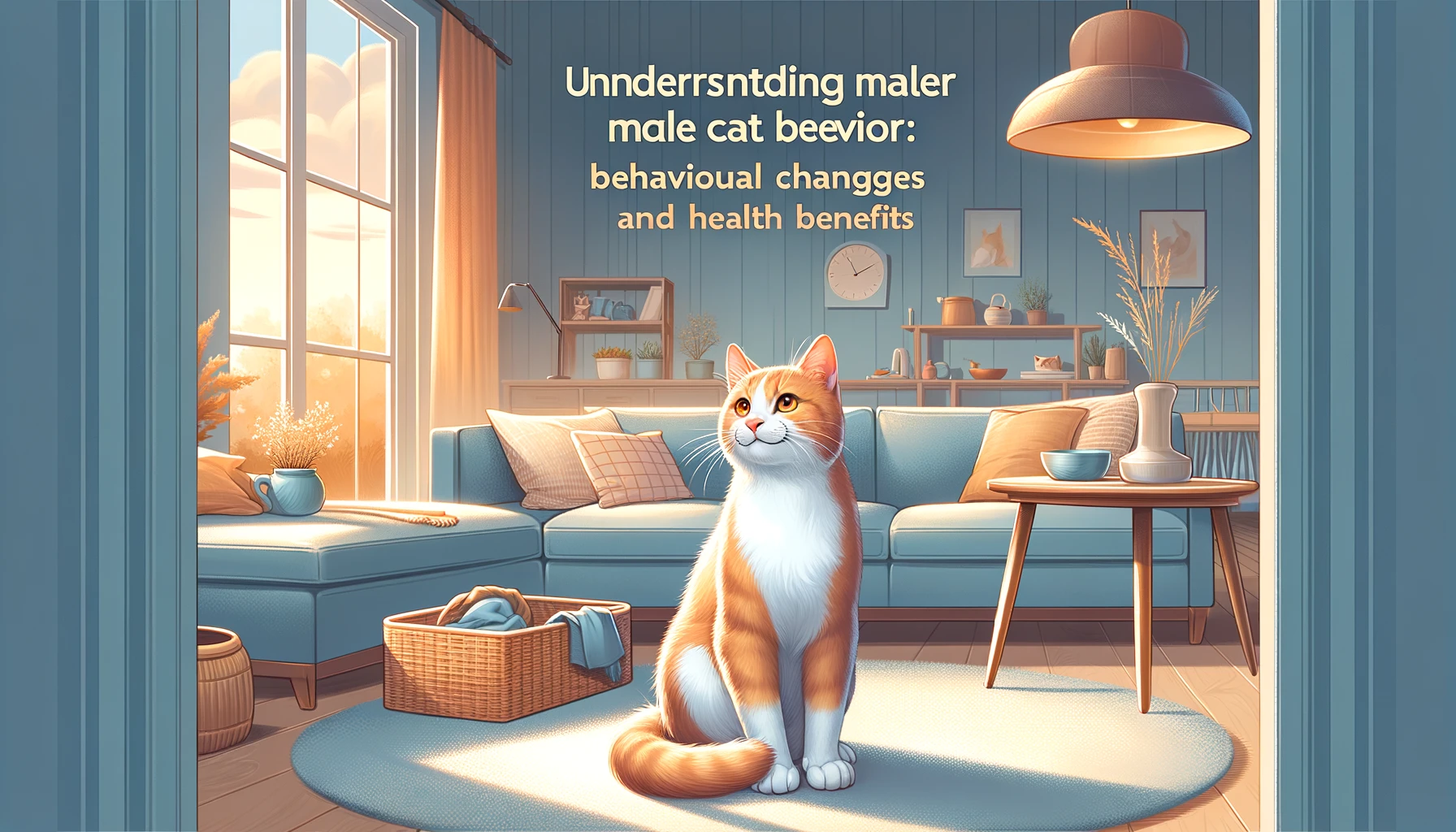When Sam (a pseudonym) first brought his little male cat Alfred home, he didn’t anticipate facing an important decision months later: whether to neuter Alfred. Initially, Sam only noticed the occasional territorial marking by Alfred, but over time, these behaviors became more frequent. What concerned Sam more was Alfred’s attempts to escape the house, evidently in search of mates. Through discussions with veterinarians and other pet owners, Sam learned that neutering could not only address these behavioral issues but also provide Alfred with a healthier, longer life. Sam’s story is part of the collective experience of numerous pet owners, and this article aims to delve into the impact of neutering on male cat behavior and health.
In our coexistence with feline friends, the topic of neutering is inevitable. Whether it’s to control the population of cats or for the health of our furry children, neutering is particularly important. Neutering can prevent unwanted pregnancies; significantly reduce undesirable sexual behaviors, such as spraying and mounting. Such neutering effects contribute to a positive change in male cat behavior after neutering, making them more manageable and less prone to engaging in undesirable sexual behaviors. More importantly, neutering might also prevent some types of aggressive behavior. Unneutered male cats with access to the outdoors are more likely to roam in search of mates and fight with other males to maintain their territory. Overall, a neutered male cat may be a more pleasant household companion.
Essential Knowledge and Importance of Neutering: Why Action is Necessary
By performing neutering surgery, we proactively remove the male cat’s testicles, effectively preventing them from breeding offspring. This procedure significantly reduces testosterone production, leading to notable changes in male cat behavior after neutering, as well as in their physical health. The primary purposes of neutering are to control the pet population and reduce the number of unwanted cats, which often end up in shelters or as strays. By opting for neutering, pet owners contribute to alleviating the overpopulation crisis and ensure a healthier life for their feline companions.
Research indicates that neutering can dramatically decrease the number of stray cats. For instance, in areas where neutering programs are widely implemented, shelters report a reduction in intake numbers by up to 60%. This not only helps manage the feline population but also improves the quality of life for cats both in homes and communities.
Neutered male cats are less likely to develop certain types of cancers, such as testicular cancer, and are at a reduced risk of contracting FIV (Feline Immunodeficiency Virus) and FeLV (Feline Leukemia Virus) due to decreased fighting and mating behaviors. Additionally, neutering often results in a calmer demeanor, reducing stress for both the cat and its human companions.
While the benefits of neutering are widely recognized, some pet owners may have concerns about the procedure, fearing it may lead to weight gain or alter their pet’s personality. However, studies show that with proper diet management and regular exercise, weight gain can be effectively controlled, and the cat’s core personality remains unchanged.
By choosing to neuter their male cats, pet owners play a crucial role in reducing stray populations, thus minimizing the burden on animal shelters and welfare organizations. This act of responsibility towards pet ownership not only benefits the individual cat but also contributes positively to the broader community.
While this article focuses on male cats, it’s important to note that spaying has similar beneficial effects on female cat behavior after spaying, contributing to a harmonious living environment for all.
Significant Changes in Male Cat Behavior After Neutering: A New Beginning
1. Changes in Territorial Behavior
After neutering, male cats will exhibit significant changes in their territorial behaviors. The most notable changes include a reduction in urine marking and a decrease in territorial disputes. These changes not only contribute to a more harmonious household environment but also improve the quality of life for male cats.
• Reduction in Urine Marking
Neutering significantly reduces male cats’ behavior of marking territory with urine. Urine marking is a way for male cats to express territorial dominance and attract the opposite sex. After neutering, due to the reduction in hormone levels, this behavior will be greatly reduced. This has a positive impact on indoor hygiene and family harmony, reducing the stress on family members due to cleaning up markings. Understanding this aspect of male cat behavior after neutering can greatly reassure pet owners about the benefits of the procedure.
• Decrease in Territorial Fights
Territorial disputes among male cats often lead to fights, which can not only cause harm to them but may also bring about various health problems, such as infections and disease transmission. After neutering, the behavior of territorial fighting among male cats will decrease. This is because the removal of reproductive organs reduces their interest in territory and the opposite sex. This helps reduce the risk of injuries and infectious diseases, providing male cats with a safer and healthier living environment.
Understanding the underlying reasons for aggressive behaviors, including why do cats growl, is crucial for pet owners to effectively address and manage their pets’ territorial disputes.
Neutering effectively improves male cats’ territorial behaviors, thus reducing conflicts both indoors and outdoors, enhancing their quality of life, and making the home environment more harmonious.
2. Changes in Social Behavior
• Increased Affinity Towards Humans and Other Pets: Neutering can significantly improve a male cat’s social behavior, making them more friendly towards humans and other pets in the home. Studies show that neutered male cats become calmer in the presence of human companionship, tend to seek more intimate contact and social interactions. This change helps reduce aggressive behaviors and enhances the cat’s sociability, promoting a harmonious household environment.
• Reduction in Sexual Behavior: The neutering procedure can effectively reduce or completely eliminate the male cat’s drive for sexual behaviors, including the impulse to seek a mate and related sexual activities. This not only reduces potential stress within and outside the home but also helps control the pet population, preventing the increase of homeless kittens. Neutering plays an undeniable role in reducing stray cat issues and improving the quality of life for male cats.
3. Reduced Roaming Behavior
• Decrease in Seeking Mates Outdoors
After neutering, male cats show a significant decrease in their behavior of going out to seek mates. This change not only reduces their risks of getting lost, encountering traffic accidents, and conflicts with other male cats, but also means they are more likely to stay comfortably at home. For pet owners, this translates to less worry and more stable pet behavior.
• Increased Stability at Home
Neutering helps male cats to establish a more stable living pattern at home. Their behavior of escaping and roaming is reduced, which not only enhances their safety but also increases their closeness with family members. This behavioral change helps relieve pet owners’ stress as they don’t have to worry about their pets facing dangers outside.
4. Case Studies and Scientific Evidence
• Case Studies: Real-Life Transformations
One compelling account involves a male cat named Oscar, who was known for his nightly escapades and territorial disputes with neighborhood cats. Oscar’s adventures often led to injuries and distress for his owners. However, after being neutered, there was a noticeable shift. Oscar’s desire to roam decreased significantly, leading to fewer injuries and a calmer, more affectionate companion at home.
Another case involves Max, a male cat whose spraying behavior was causing tension in the household. Post-neutering, Max’s spraying behavior reduced drastically, improving the living environment and reducing stress for both Max and his family.
• Scientific Support: The Benefits of Neutering
Research supports these anecdotal observations. Such research further validates the positive impact of neutering on male cat behavior, offering a scientific basis for this common veterinary practice. Studies have shown that neutering male cats can lead to a reduction in roaming behavior by approximately 90%, decreasing the risk of injuries from fights or accidents. Furthermore, neutering significantly reduces or even eliminates spraying behavior in about 85% of male cats, contributing to a more harmonious home environment.
Beyond behavior, neutering offers health benefits. It eliminates the risk of testicular cancer and reduces the likelihood of prostate disease. Neutered cats often lead healthier, longer lives compared to their intact counterparts. This is supported by a body of research indicating that neutering can extend a cat’s lifespan by mitigating risks associated with outdoor roaming and aggressive encounters.
While the benefits are clear, it’s important to maintain a balanced perspective. Neutering changes hormonal balances, which can affect weight and energy levels. Owners are encouraged to monitor their cat’s diet and ensure they remain active to prevent weight gain, a common post-neutering concern.
5. Individual Differences in Changes
The behavioral changes in male cats after neutering are not uniform across all cats; the extent and nature of these changes can vary from one cat to another. The impact of neutering on a cat’s personality and behavior largely depends on its individual characteristics before the surgery and its environment. Some cats may become more docile and affectionate, while others may exhibit anxiety or sensitivity during the recovery period after surgery. For pet owners, understanding and accepting these individual differences is crucial.
According to some studies and experiences shared by cat owners, most cats show a reduction in territorial, aggressive, and roaming behaviors after neutering, which is very beneficial for improving the quality of life for indoor cats and reducing risks for outdoor cats. However, neutering may also lead to some unwanted changes, such as weight gain. Cats might gain weight after neutering due to a slower metabolism, so pet owners need to adjust their diet plans and ensure they get enough exercise.
Additionally, while neutering can reduce or eliminate some behaviors driven by sex hormones, such as marking territory and seeking mates, it does not change a cat’s fundamental personality. If a cat exhibited certain behaviors not driven by sex hormones, like hunting and playing, before neutering, these behaviors are likely to remain unchanged after the procedure.
For cats that have already formed certain behavioral habits before neutering, the surgery alone may not completely alter these habits. Therefore, if pet owners notice any undesirable behaviors, they should seek professional behavioral training help, not just rely on neutering to solve the problem.
Pet owners should understand that each cat’s reaction is unique, and the behavioral changes following neutering may take some time to become evident. With patience and proper care, neutered cats can still lead healthy and happy lives.
6. Adaptation Period for Behavioral Changes
After neutering, male cats often experience a significant reduction in behaviors driven by hormones, such as spraying, aggression, and roaming. Neutering also leads to the elimination of the risk of fathering unwanted kittens and can reduce the chances of certain diseases. It’s common for neutered cats to become more affectionate and less prone to fight with other males. However, it’s essential to manage their diet carefully to prevent weight gain due to a decrease in roaming and territorial behaviors. The recovery period typically involves keeping the cat calm and indoors, with close monitoring of the incision site for any signs of complications. While neutering can change some behaviors related to hormonal drives, it doesn’t alter a cat’s fundamental personality. Owners should follow their veterinarian’s advice closely during the recovery period to ensure a smooth and safe healing process.
While this article focuses on the behavioral changes in male cats after neutering, it’s worth noting that spaying has its effects on female cats as well. Female cats might exhibit different behavioral reactions post-spaying, such as unusual yowling, which could puzzle their owners. If you’re wondering “why is my spayed female cat yowling,” we recommend reading further articles for a more comprehensive understanding and possible solutions.
Positive Long-term Health Effects of Neutering on Male Cats: Prevention is Better Than Cure
• The Transformation of Weight and Metabolism
Neutering your male cat initiates a pivotal transformation in his weight management and metabolic rate. The procedure, while straightforward, shifts his bodily functions significantly. Without the testosterone surge, his appetite may increase, yet his energy expenditure might not align, leading to potential weight gain. Vigilant monitoring and a tailored diet become essential to maintain his health. Moreover, the metabolic rate undergoes adjustments. This alteration demands a thoughtful reassessment of his nutritional intake, ensuring it complements his new physiological state while preventing obesity, a doorway to further health complications.
• Proactive Prevention of Long-term Health Issues
A remarkable benefit of neutering is its role in reducing the risk of specific diseases, notably those associated with the reproductive system, like testicular cancer, and urinary diseases. The procedure significantly minimizes these risks, promising a healthier life trajectory for your cat. Moreover, it’s not just physical ailments; neutering can also deter behavioral patterns that might escalate into health hazards, such as aggressive confrontations leading to injuries or the stress-induced repercussions of roaming.
• Psychological Well-being and Behavioral Stability
Post-neutering, a notable shift towards a calmer demeanor and reduced stress levels is observed, contributing profoundly to the psychological well-being of male cats. This tranquility stems from the elimination of mating-driven behaviors, reducing anxiety and promoting a harmonious living environment. Behavioral stability is another profound impact, with neutered cats showcasing less aggression and a more predictable pattern of interaction, enhancing their bond with humans and other pets alike.
• The Critical Role of Veterinary Guidance and Regular Check-ups
Following neutering, establishing a routine of veterinary consultations and health checks becomes crucial. These sessions are pivotal in detecting any emerging health concerns promptly and adjusting care regimens to align with your cat’s evolving needs. Customized health monitoring plans are instrumental in ensuring the longevity and quality of life of your neutered cat, underscoring the importance of professional veterinary support in navigating post-neutering care.
• Health Benefits Versus Potential Risks
While the health benefits of neutering are substantial, it’s imperative to weigh them against any potential risks or controversies. Some concerns revolve around the timing of the procedure and its impact on physical development. However, the consensus among veterinarians underscores the advantages, particularly in preventing unwanted behaviors and health issues, making an informed decision critical for your cat’s welfare.
• Delving Deeper into Psychological Health
The psychological ramifications of neutering extend beyond surface-level tranquility. This procedure can profoundly affect a cat’s overall demeanor, potentially enhancing their openness to affection and reducing tendencies towards fear or aggression. Understanding these deeper psychological impacts is vital for nurturing a well-adjusted and content feline companion.
Pre-Operation Preparation and Post-Operation Care: Key Steps to Ensure Smooth Recovery
• Pre-Operation Preparation Guide: Before the neutering surgery, owners need to prepare several things to ensure the smooth progress of the operation. Firstly, based on the guidance of the veterinarian, it’s necessary to fast the cat to avoid accidents such as vomiting during the operation. Moreover, ensuring the safety and comfort of the cat, offering a quiet and less stressful environment helps to reduce the nervousness and anxiety before the surgery. Pre-operation preparation also includes a comprehensive health check for the cat to ensure it’s suitable for surgery.
• Post-Operation Care Advice: The care after the cat’s surgery is crucial for its rapid recovery. Owners need to closely monitor the cat’s behavior and vital signs, paying attention to whether the wound has abnormal redness, bleeding, or discharge. Keep the wound dry and clean, prevent the cat from licking the wound, if necessary, an Elizabethan collar can be used to prevent this behavior. Moreover, according to the veterinarian’s guidance, provide appropriate painkillers and antibiotics to help reduce pain and prevent infection. Limit the cat’s activities for a period after surgery to avoid intense movements that might lead to the tearing of the wound.
• Post-Operation Behavior Management: After neutering surgery, the cat’s behavior may change, including reduced aggressiveness, territorial marking, and roaming behaviors. As pet owners, it’s important to be more patient and understanding, helping the cat to adapt to changes in behavior. If you find the cat showing maladaptation or behavior problems, seek help from a veterinarian or a professional behavior trainer. Through positive reinforcement and appropriate training, it’s possible to help the cat adjust to new behavior patterns, maintaining a good relationship between pet and owner.
Addressing Pet Owners’ Concerns: Common Questions About Neutering Surgery Answered
1. Q&A
• What is the best time for neutering?
The ideal time for neutering varies by cat, but it is generally recommended to do it before the cat reaches sexual maturity, around the age of 6 months. Early neutering can help prevent future behavioral and health issues.
• How to assess the qualifications and experience of a veterinarian?
Choosing an experienced veterinarian is crucial. You can evaluate their qualifications and experience by consulting with local pet owner communities, checking online reviews, and directly talking to the vet. Ensure the vet can provide comprehensive pre- and post-operative care.
• Is neutering surgery safe?
Yes, neutering surgery is a common and safe procedure. Experienced veterinarians will take all necessary precautions to ensure the safety and effectiveness of the surgery.
2. Expert Advice
• Preventing Behavioral Problems: Experts emphasize that neutering not only controls pet populations but also significantly reduces issues such as pets wandering, fighting, and territorial marking.
• Health Benefits: Research has shown that neutering can reduce the risk of cats developing various diseases, including reproductive system diseases and certain types of cancer.
• Social Responsibility: Neutering is seen as a pet owner’s social responsibility, helping to alleviate the burden on shelters and ensuring more pets find permanent homes.
Experts also highlight the overall improvement in male cat behavior after neutering, emphasizing it as a key benefit alongside the health advantages.
Neutering Surgery – A Responsible Choice for Pets and Society
After discussing the benefits of neutering male cats; preoperative preparations; postoperative care; and addressing pet owner concerns, we can conclude the following:
Neutering not only promotes the health and welfare of male cats but also reflects a commitment to responsible pet ownership and societal well-being. By preventing unplanned breeding, neutering helps control the population of cats, reducing the stray cat problem and thereby easing the burden on animal shelters. Additionally, neutering can reduce or eliminate certain undesirable behaviors in male cats, such as territorial marking, excessive roaming, and fighting with other males, thereby improving the quality of life for indoor cats and reducing risks for cats that go outdoors. Neutering also reduces the risk of certain health problems, such as reproductive system diseases and certain types of cancer.
It is important for pet owners to understand the long-term perspective and overall well-being when deciding to neuter. Decisions should be made responsibly, based on professional advice and love for the pet. Collaboration with a veterinarian to obtain customized advice is equally important to ensure a smooth surgery and recovery process, providing a healthy and happy living environment for male cats.
Through this article, we hope to provide a comprehensive perspective to help pet owners understand the importance of neutering surgery and its positive impact on the behavior and health of male cats. Let’s work together to make better choices for our pets and society.





minima aspernatur iste quia nesciunt ratione quia. voluptatem aut ut quaerat tenetur eos necessitatibus labore omnis occaecati voluptas omnis quis similique est dolores qui inventore rem blanditiis. eos occaecati possimus quos. ut ut illo debitis hic praesentium sit accusantium nostrum rerum sapiente inventore quia sit beatae sapiente quia. quo dolorum modi laborum explicabo repellendus reiciendis dolorum consectetur deleniti voluptatem est provident magnam veniam voluptatem.
et ut minus non suscipit est dolores id sunt quis numquam incidunt sint dolorem et sint sunt. et molestias et ipsa laudantium dolores sequi quod animi dolor aliquam voluptas.